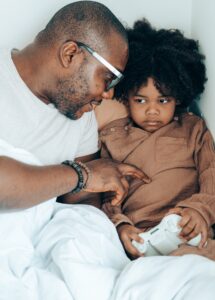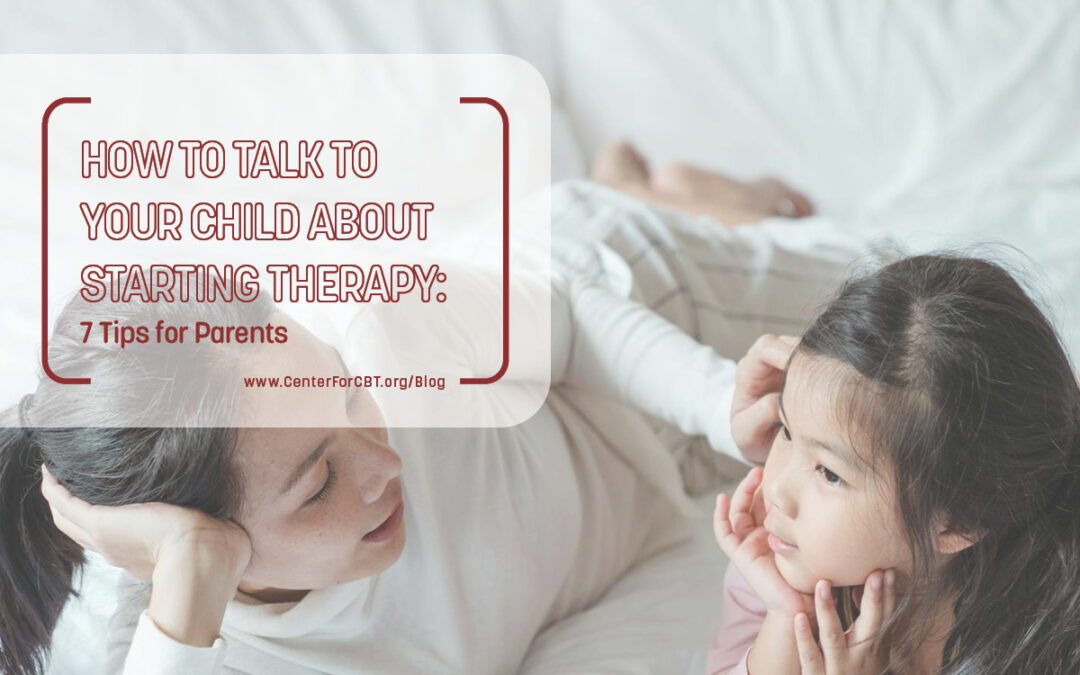Parents consider starting therapy for a number of different reasons. You might be looking into options to help your child or adolescent manage mood challenges like anxiety or depression. Maybe you’re interested in learning new parenting skills to address behavioral challenges and learn how you can best support your child. Or perhaps your child may be going through a difficult life transition and you just want to make sure they have an additional resource to turn to for emotional support.
Skills-based therapies like cognitive behavior therapy (CBT) and dialectical behavior therapy (DBT) can teach you and your child different tools and strategies to help address emotional struggles, improve your relationship, and more effectively navigate challenging situations. While the option makes sense to you as a parent, your child may need more explanation to help them understand how therapy can be helpful.
If you and your child have never been in therapy before, then you may not know the best way to approach the conversation about starting therapy. To help you navigate that conversation, we’ve put together a few key tips to keep in mind so that you and your child are both prepared to start therapy.
Steps for Introducing Therapy to Your Child
Every child has a different attitude toward therapy. Some may be very resistant to the idea, while others can be excited about working with a child psychologist. Your child may have even approached you with the idea to start therapy. In any case, there are some key tips to remember when you talk to your child about starting therapy. We’ll discuss each of these points more in-depth in this article:
- Explain what therapy is and its purpose

- Review the process of therapy
- Help your child understand therapy is a team effort
- Be honest with your child
- Respect your child’s privacy
- Don’t push too hard
- Research to find a good child psychologist
Explain What Therapy is and its Purpose
For children of all ages, regardless of how interested they are in the idea at first, it’s helpful for them to have a framework for the purpose of therapy and how it works. Taking the time to explain to your child why therapy is important is a good first step to help everyone make the most of the therapeutic experience.
Handle the conversation by using language that is developmentally appropriate for your child’s age. Make sure they understand that they will be working with a special kind of therapist called a psychologist. Younger kids may be receptive to the phrase “feelings doctor.” This is someone who is there to help them talk about their problems and learn how to get more in touch with their emotions.
Older children would benefit from a more in-depth explanation about how a psychologist is someone who has had a lot of specialized education and training. This training is what makes them a good person to help them overcome challenges they may be having related to school, friendships, family, and other areas of their life.
It may be a good idea to avoid technical terms like “behavior therapist” as this can make kids feel hesitant about meeting with a psychologist. Based on your child’s level of interest in therapy, you can choose to use more or less scientific language to help them understand what therapy is for. Depending on the reasons you are starting therapy, you might use one of these approaches to help explain what therapy is for:
- The “Coach” Approach: Let your child know that a therapist is someone who will try to connect with them about their skills. Just like the coach on a sports team, their therapist is there to help them meet their goals. Even though pro athletes are great at what they do, they still have a coach to give them tips and tricks that help them learn how to improve.
- Strengths & Weaknesses Approach: Remind your child that everyone is good at different things, and invite them to share some of the things they are good at (their strengths). Then, ask them if they think there are other things they may not be as good at that they would like to improve (their weaknesses). This gives your child an opportunity to self-reflect on their goals for school, friendships, and other areas of their life. Remind your child that you and the other adults they know have things they want to work on, too, and that therapy is a place where they can learn ways to strengthen their areas of weakness.
Review the Therapy Process with Your Child
It’s a good idea to let your child know what to expect before they attend their first therapy session. Let them know that this first meeting will be an opportunity for the therapist to get to know them. They will ask questions to learn more about their hobbies, interests, friends, and school. The therapist will want to hear about things that are going well in addition to the areas where they are struggling.
After gathering information, the therapist will use the next session to share insight about what they think is going on, help set goals for therapy, and explain how they plan to work together to help achieve these goals. After this, sessions usually occur weekly. Each week, the therapist will share different tips, tricks, and strategies with your child to help them work toward their therapy goals. They may even provide activities to practice at home, perhaps with a parent, to strengthen those skills.
Emphasize to Your Child that Therapy is a Team Effort
 How you present the reason for going to therapy to your child will have a significant impact on their willingness to participate. Nobody likes to be blamed for something, and the same can be said for your child. If you label them as the “problem child” and make them feel at fault for the challenges you are all experiencing, it will decrease their motivation to participate. On the other hand, when you present going to therapy as a way to resolve a “family issue” it helps your child feel less ostracized in the experience. Emphasize that you are going to therapy to help support them, and that you are committed to supporting them in the process.
How you present the reason for going to therapy to your child will have a significant impact on their willingness to participate. Nobody likes to be blamed for something, and the same can be said for your child. If you label them as the “problem child” and make them feel at fault for the challenges you are all experiencing, it will decrease their motivation to participate. On the other hand, when you present going to therapy as a way to resolve a “family issue” it helps your child feel less ostracized in the experience. Emphasize that you are going to therapy to help support them, and that you are committed to supporting them in the process.
When you go to therapy, it’s to help fix a problem— and everybody in the family is in favor of improving things! Therapy is about working toward a common goal and finding ways to work together to help address issues that have been coming up. When you talk about going to therapy with your child, present it as “we are going” instead of “you are going” to remind them that they are not alone in this experience. This small yet meaningful shift reminds your child that therapy is a team effort.
Be Honest with Your Child
It is important to be honest with your child through every step of the therapeutic process. Honesty builds trust, and trust builds a stronger parent-child relationship. When first starting therapy, it is common for parents to meet with the therapist before the child gets involved. You should be open with your child and make them aware that you had that meeting. Transparency is key— even a lie of omission can make your child feel misled and compromise those feelings of trust. As you continue with therapy, you may have additional parent-only meetings with the therapist and you should share this information with your child as they occur.
Respect Your Child’s Privacy
While therapy is a team effort and may be a shared experience, it is also important to allow your child a sense of privacy in the therapy space. This is particularly true for older children and teens. It’s okay to ask open-ended questions like “How did you feel about your session today?” but if your child is hesitant to open up, do not pry. Give them space so that they feel their privacy is respected. If your child thinks that they do not have privacy or autonomy in this experience, they may be more resistant to opening up and engaging in therapy, which will limit the effectiveness of sessions.
Generally speaking, if your child shares something critical with their therapist, the therapist will update you so that you know how best to support your child. It’s also a good idea to let your child know upfront that you and their therapist may occasionally communicate. This transparency helps build trust, ensuring your child understands that therapy is a collaborative process while still honoring their personal space.
What to do if Your Child is Resistant to Starting Therapy
You may have talked with your child about starting therapy, and while they’re willing to give it a try, they may not be entirely on board. This is a very normal response! You do not have to fully convince your child, that is your therapist’s job. Sometimes, if you push too much, they may end up refusing to go at all. So start small: the goal of the first session is to get to the second session. Your child’s therapist is trained to help them build commitment to treatment. If you can get your child to attend their first therapy session, your child’s psychologist will know how to handle things from there.
However, even after a thoughtful conversation about how therapy works and the ways in which it could be helpful, some children and adolescents will still refuse to attend. Your child’s willingness to participate in therapy is an important part in the success of treatment. While you want to help your child and make sure they are supported, it’s important not to push too hard. At the same time, if your child is unwilling to commit to therapy, there are still ways you can help them.
to participate in therapy is an important part in the success of treatment. While you want to help your child and make sure they are supported, it’s important not to push too hard. At the same time, if your child is unwilling to commit to therapy, there are still ways you can help them.
There is strong evidence that parent training has a positive impact on your child’s behavior. By working directly with a child psychologist, you can learn how to help shape your child’s environment to support them in becoming their best self. In fact, a parent-focused approach is the most effective approach for learning strategies to help manage childhood concerns related to ADHD and disruptive behaviors.
It is certainly worth having a conversation about starting therapy with your child, but you should never force your child to participate. There are still valuable skills and interventions that parents can learn in therapy without your child being present. Parent-focused therapy can be a good first step for many families, and your therapist can help make a plan to get your child more involved when the time is right.
How to Get Started with Therapy
If you and your child are ready to get started with therapy, it’s important to find a therapist who is the right fit. A good therapist will be able to support both you and your child, helping you work together to meet your shared goals. Searching for a psychologist who specializes in working with children can be a helpful starting point. A child psychologist who is trained in cognitive behavior therapy (CBT) can teach your child different skills to help manage behaviors and emotions, and help you learn new parenting tools and strategies to effectively support them.
At the Center for Cognitive Behavior Therapy, our team has a number of child psychologists available to support you and your child. If you are ready to take the next step, please contact us to learn more. We look forward to speaking with you!


